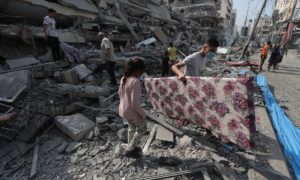Beijing: In wake of the criticism France is witnessing against its President Emmanuel Macron’s remarks against Islam, China has expressed hope that the worrying situation in France will be settled through dialogue to ensure mutual respect between the “relevant parties”.
“China has always supported the strengthening of dialogue between different civilisations and religions, insisted on mutual respect and equal treatment of each other. We hope that the relevant parties will be able to reach a settlement through dialogue and consultations”, Chinese Foreign Ministry spokesman Wang Wenbin said during a Friday briefing.
His comments came after the three people were killed at Notre-Dame cathedral in the southern French city of Nice by a 21 one-year-old man who allegedly had shouted “Allahu Akbar” (God is greatest) during the attack.
The attack was the third in less than two months that French authorities have attributed to “Muslim extremists”, including the beheading of a teacher who had shown caricatures of the Prophet Muhammad (ﷺ) in class after the images were re-published by a satirical newspaper targeted in a 2015 attack.
French President Emmanuel Macron called the incident an “Islamist terror act” when he arrived at the crime scene, a report by Russia based news agency Sputnik international said.
The report said that the anti-terrorism department of the prosecutor’s office has since opened a probe into the attack, while the attacker was hospitalised.
The assault was followed by two acts of violence on the same day, namely, a stabbing attempt in the French city of Avignon and another one near the French Consulate in Saudi Arabia.
Meanwhile, the French president, according to the report, has taken a pledge to step up efforts in the fight against “extremism” and expressed support for manifestations of freedom of speech, including in the form of “religious caricatures”, believed to be the reason behind the killing of a teacher in Paris.
On October 17, a history teacher named Paty who had shown cartoons of the Prophet Muhammad (ﷺ) in class was beheaded in northwestern suburb around 30 kilometres from the centre of the French capital and his assailant was shot dead by the police as they tried to arrest him.
The accident occurred on the outskirts of Paris at around 5 pm (1500 GMT) near a school in Conflans Saint-Honorine.
The victim was a history teacher who recently discussed caricatures of the Prophet Mohammed (ﷺ) in the class, the report said quoting police officials.
International reports said that prosecutors were treating the incident as “a murder linked to militants” and related to a “criminal association with militants”.
The allegations are similar to charges brought last month against a 25-year old Pakistani man who wounded two people in a meat cleaver attack to avenge the publication of caricatures of the Prophet Mohammed (ﷺ) by the satirical weekly Charlie Hebdo.
The attacker seriously injured two employees of a TV production agency, whose offices are on the same block that used to house Charlie Hebdo.
On October, 26, Pakistan Prime Minister Imran Khan wrote an open letter to the Facebook CEO Mark Zuckerberg seeking a ban on “Islamophobic” content on the social media giant, just as it has ‘banned questioning or criticizing the holocaust’ – warning of an increase in marginalization and polarization of the Muslims across the world.
Referring to the situation in France where Islam was being ‘militancy’, Khan in his letter published on Twitter cited that “growing Islamophobia” is encouraging extremism and violence across the world — especially through social media platforms such as Facebook.
“I would ask you to place a similar ban on Islamophobia and hate against Islam for Facebook that you have put in place for the Holocaust,” Khan said.
Facebook said this month it was updating its hate speech policy to ban any content that denied or distorted the Holocaust.
Rasing concerns, Khan wrote, “How will the French distinguish radical extremist Muslim citizens and the mainstream Muslim citizenry of Islam?”.
Earlier on Sunday, Khan said that French President Emmanuel Macron had “attacked Islam” by encouraging the display of cartoons depicting the Prophet Mohammad (ﷺ).
Khan’s comments came after Macron paid tribute to a French history teacher beheaded by a young man who wanted to avenge the use of cartoons depicting the Prophet Mohammad (ﷺ) in a class on freedom of expression.
Meanwhile, the Ambassador of France to Pakistan was called to the Ministry of Foreign Affairs to convey the deep concerns over the recent systematic resurgence of blasphemous acts of republication of caricatures of the Holy Prophet Hazarat Muhammad (ﷺ) and desecration of the Holy Quran by certain irresponsible elements.
According to a press release issued from the Foreign Office of Pakistan, the spokesperson of the office underscored that such “illegal and Islamophobic” acts hurt the sentiments of Muslims across the world, including those in Pakistan.
Furthermore, such actions could not be justified in the name of freedom of expression.
It was further conveyed that Pakistan strongly condemned equating Islam with militancy, for narrow electoral and political gains.
Not only in Pakistan, but the outrage against the Macron’s anti-Islam remarks was also witnessed internationally even as Middle Eastern countries decided to boycott the French-made products.
Macron’s comments even led to a huge furore in the Arab world and beyond. In response to his remarks, a number of shops in Kuwait, Jordan and Qatar have removed French products, while protests were observed in Libya, Syria and Gaza.
On social media sites, pictures also showed Kuwaiti store workers removing French Kiri and Babybel processed cheese from shelves and a number of Jordanians have changed their Facebook profiles to add the message “Respect Mohammad the Prophet of Allah (God)”.
However, France soon urged the Middle East to end calls for a boycott which seem to be growing online and offline.
Terming the calls “baseless”, the French Foreign Ministry said the demands for a boycott were being “pushed by a radical minority”.
In response to the outrage Macron faced, India on October 29, strongly condemned the “personal attacks” against Macron.
In a statement, the Foreign Ministry of India also condemned the attack that killed a French teacher, and said: “there is no justification for terrorism for any reason or under any circumstance”.
“We strongly deplore the personal attacks in unacceptable language on President Emmanuel Macron in violation of the most basic standards of international discourse,” the MEA said.
“We also condemn the brutal terrorist attack that took the life of a French teacher in a gruesome manner that has shocked the world. We offer our condolences to his family and the people of France,” it said.
After the statement, French Ambassador to India Emmanuel Lenain thanked India saying both countries can count on each other in the fight against terrorism. “Thank you @MEAIndia. France and India can always count on each other in the fight against terrorism,” he tweeted.
Thank you @MEAIndia. France and India can always count on each other in the fight against terrorism.https://t.co/oXZ0XpKNSZ pic.twitter.com/iGylUYxUB6
— Emmanuel Lenain (@FranceinIndia) October 28, 2020
On October 29, in a political event held at Iqbal Maidan in Bhopal city of Madhya Pradesh, members of the Muslim community also protested against the anti-Islam remarks by Macron.
A Congress MLA Arif Masood, according to a report by India TV, demanded that the government of India must ask the Indian Ambassador to France to register protest against “anti-Muslim” stand of that country’s regime.
He accused Macron of supporting offensive cartoons of Prophet Muhammad and intentionally hurting the sentiments of Muslims.
Free Press Kashmir is now on Telegram. Click here to Join.
FPK Android App for 2G. Click here to Download.












